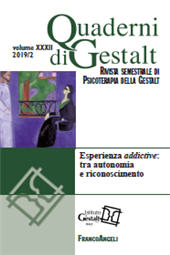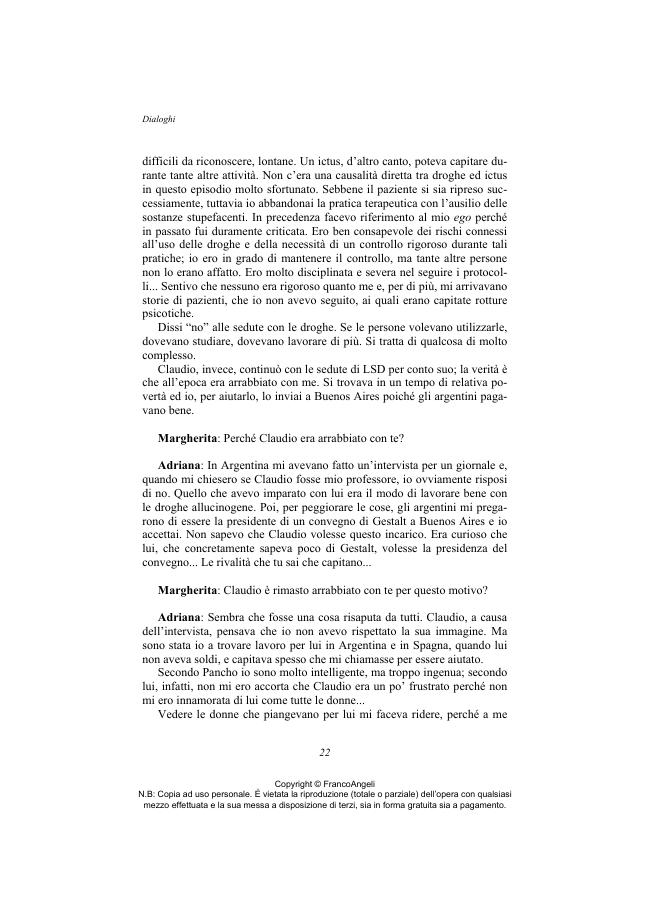La psicoterapia della Gestalt in Cile
13-31 p.
In questo dialogo Adriana Schnake e Margherita Spagnuolo Lobb ripercorrono la storia della psicoterapia della Gestalt in Cile. Negli anni '70, la psichiatra sudamericana, allieva di Ignacio Matte Blanco, rivoluzionò il percorso formativo in psichiatria, promuovendo lo studio della fenomenologia all'interno della facoltà di medicina. In quel periodo Adriana Schnake e Francisco Huneeus cominciarono a tradurre i libri di Fritz Perls e, insieme a Claudio Naranjo, cominciarono a diffondere il loro modello clinico in Sud America e nel resto del mondo. I fondatori della psicoterapia della Gestalt cilena si dedicarono allo studio dell'uso delle sostanze allucinogene durante le sedute di psicoterapia.
In seguito ad un grave incidente accaduto ad un paziente, Adriana Schnake abbandonò l'uso degli allucinogeni nella pratica psicoterapeutica e sviluppò un modello clinico focalizzato sull'integrazione mente-corpo. Margherita Spagnuolo Lobb ribadisce l'importanza di un modello clinico che superi la dicotomia mente-corpo e sottolinea l'esistenza di un legame tra stili percettivi e manifestazioni psicopatologiche. In conclusione, le due autrici ribadiscono l'importanza per i giovani psicoterapeuti di frequentare un percorso formativo finalizzato all'apprendimento di un metodo clinico fenomenologico contraddistinto dall'onestà e dall'umiltà verso i pazienti. [Testo dell'editore].
In this dialogue Margherita Spagnuolo Lobb and Adriana Schnake retrace the foundation of Chilean Gestalt Psychotherapy going back in time to the years of Salvador Allende's Presidency and the golpe of Augusto Pinochet in 1973. In those years Adriana Schnake was professor of psichiatry and, under the influence of professor Ignacio Matte Blanco, revolutioned psychiatry training in University, focusing not only on psychopathology but encouraging the adoption of a phenomenological perspective by medical students. Adriana Schnake with Francisco Huneeus began to translate and study the books of Fritz Perls; together with Claudio Naranjo, who met Fritz Perls personally when he was in Esalen, they introduced Gestalt psychotherapy in Chile and promoted their clinical approach all over Sud America and the rest of the world.
Adriana Schnake underlines the fidelity of her phenomenological clinical model to the original way of Fritz Perls of practicing Gestalt psychotherapy, disregarding the over-intellectualization of the Gestalt psychotherapy model adopted in the New York Institute by the followers of Laura Perls. Adriana Schnake describes in detail the long collaboration with Claudio Naranjo and explains how one of the most relevant reasons for disagreement among the founders of Chilean Gestalt Psychotherapy was the different degree of interest in the controversial practice of using hallucinogenic substances during psychotherapy sessions. Claudio Naranjo has dedicated his whole life to the study of the effects of LSD and other hallucinogenic substances in the treatment of psychiatric disorders.
Adriana Schnake, after a period of intense experimentation with drugs, gave up the use of substances during sessions of psychotherapy, due to a serious accident that occurred to a patient, and developed a phenomenological model of therapy centered on the mind-body integration. Margherita Spagnuolo Lobb specifies the importance of a theoretical and practical model that goes beyond the dichotomy mind-body and underlines the existence of a link between certain perceptual styles and psychopathology. Adriana Schnake e Margherita Spagnuolo Lobb examine and compare perceptual styles and symptoms in neurosis and psychosis and reaffirm the importance of adopting a phenomenological perspective and learning humility and honesty with patients, especially for therapists in training. [Publisher's text].
-
Articles du même numéro (disponibles individuellement)
-
Informations
Code DOI : 10.3280/GEST2019-002002
ISSN: 2035-6994
DISCIPLINES
KEYWORDS
- Psicoterapia della Gestalt, mente-corpo, Fritz Perls, polarità, dialoghi del corpo, Naranjo
- Gestalt therapy, mind-Body, Fritz Perls, polarity, dialogues of the body, Naranjo



